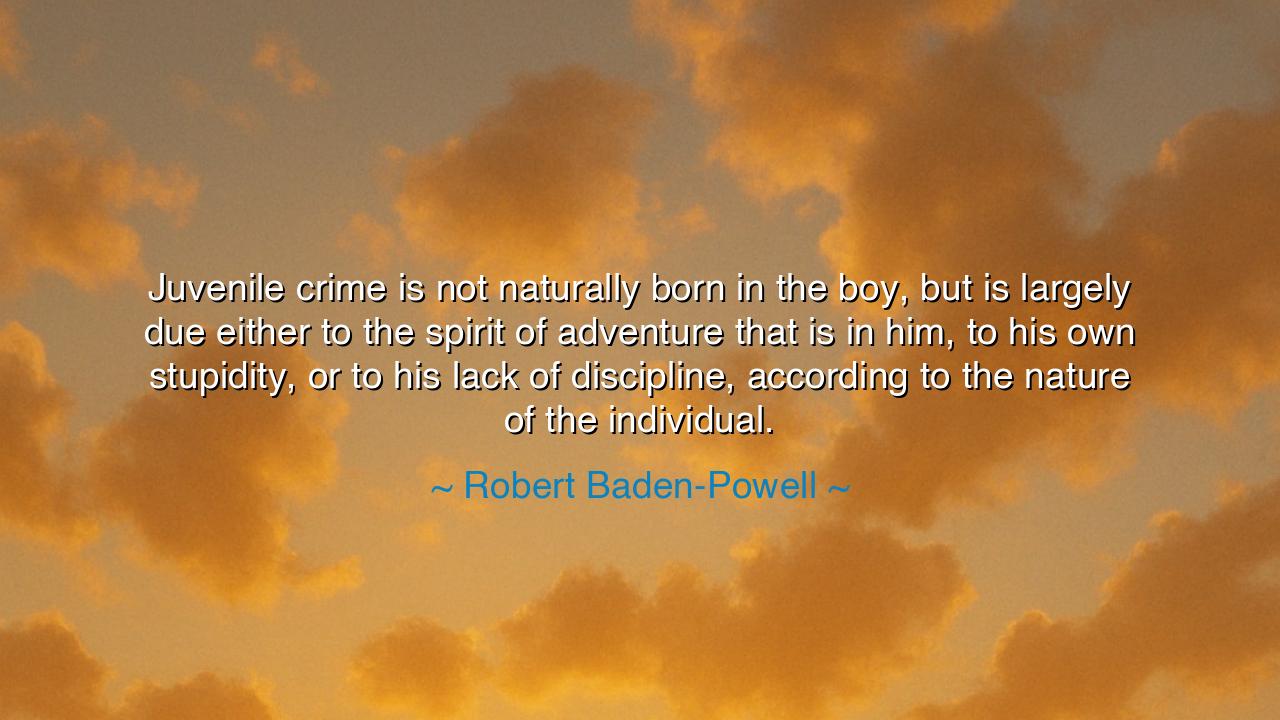
Juvenile crime is not naturally born in the boy, but is largely
Juvenile crime is not naturally born in the boy, but is largely due either to the spirit of adventure that is in him, to his own stupidity, or to his lack of discipline, according to the nature of the individual.






Robert Baden-Powell, soldier, visionary, and founder of the Scout Movement, once spoke these words of piercing insight: “Juvenile crime is not naturally born in the boy, but is largely due either to the spirit of adventure that is in him, to his own stupidity, or to his lack of discipline, according to the nature of the individual.” In this utterance, we hear not condemnation, but understanding. For Baden-Powell saw the restless fire that burns in youth, a fire that, untended, may consume, but when guided, may illumine the world.
The origin of this truth lies in Baden-Powell’s own encounters with boys in the streets of industrial England, where poverty, neglect, and temptation led many to trouble. He saw that most were not evil by nature. Rather, their missteps were born of misdirected energy — the daring that longs for challenge, the ignorance that blinds, the absence of guiding hands to train the will. To dismiss them as wicked was to miss their potential. To condemn them outright was to waste the raw material of greatness. Thus, in founding the Scouts, he sought not to crush this energy, but to harness it, turning the same spirit of adventure that leads to mischief into a force for courage, service, and honor.
History gives us examples of this very transformation. Recall the story of Admiral Horatio Nelson, who as a boy was known for wild exploits and reckless behavior. Yet under the discipline of the Royal Navy, his restless adventure was channeled into daring strategies and audacious victories that preserved his nation. The boy who might have squandered his life in folly became, through guidance and discipline, a lion of the seas. Baden-Powell knew this pattern: within every boy who errs lies the seed of greatness, awaiting cultivation.
So too did Baden-Powell himself embody this truth. A soldier of courage, he survived sieges and wars not merely through strength of arms but through ingenuity and boldness — qualities of the very same adventurous spirit that can lead a youth astray if unguided. He understood, therefore, that the task of society is not to crush the daring of the young, but to give it noble purpose. Better to let a boy climb mountains, camp in the woods, and learn the honor of service than to let his fire turn to theft or rebellion. Hence the Scouts became a school not of punishment, but of redirection — discipline bound with adventure.
The lesson for us is radiant: do not despise the folly of youth, but seek its root. When a child errs, ask not only, “What crime has he done?” but also, “What longing in him has been unmet? What thirst for challenge, for belonging, for discipline, lies hidden behind his act?” For to answer this is to turn failure into opportunity. Stupidity is often but ignorance; ignorance can be taught. Lack of discipline is but an untrained will; the will can be forged. And the spirit of adventure, though dangerous, is also divine, for it is the spark that drives explorers, warriors, and saints.
What, then, shall we do? Parents, guide the daring of your children with patience. Teachers, see in every mischievous act not a threat but a call for engagement. Leaders, offer the young not chains but paths — paths of service, paths of honor, paths where their restless strength may be given purpose. Do not let their fire burn out or consume them; shape it into the torch that lights their way.
Therefore, O guardians of the generations, remember Baden-Powell’s wisdom: juvenile crime is not born of malice, but of misdirected energy. Within the wayward boy is a future man of greatness, if only his fire be tempered with knowledge, his folly corrected with love, his daring trained with discipline. To see this, to act upon it, is to build not only noble men, but noble nations. For the strength of tomorrow lies not in punishing the errors of youth, but in shaping them into the pillars of virtue.






AAdministratorAdministrator
Welcome, honored guests. Please leave a comment, we will respond soon